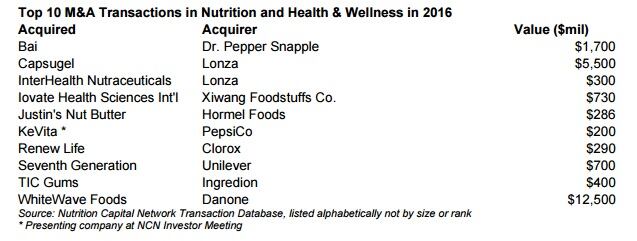Numerous nutrition and dietary supplement companies have been acquired by Chinese buyers in recent times, including: Xiamen Kingdomway Group Co. buying Doctor’s Best; Xiwang Foodstuffs Company Ltd buying Canadian company Iovate Health Sciences International Inc; and Hong Kong-listed Biostime International acquiring Australia’s Swisse Wellness.
There was also rumored interest in GNC Holdings Inc last year from Chinese buyers, but this has not yet developed further. Reuters recently suggested that Chinese buyers may be interested in acquiring The Nature's Bounty Co from the Carlyle Group (although a recent report in Bloomberg named BC Partners, CVC Capital Partners, Bain Capital and Xio Group as potential buyers).
While there is the perception that Chinese money is interested in the “Made in the USA” halo of quality for Chinese consumers, the numbers suggest a different scenario.
Grant Ferrier, NCN’s CEO and co-founder, told us: “Specific to China and supplements, in our database of 15 significant M&A transactions in 2016 there were only five in the second half of the year and four of them involved Chinese buyers. However, two of those four were Australian companies. Chinese investors may be more interested in Australia and Canada than the US, and not just for the current political situation. One of our top 10 overall transactions on our list was the acquisition of Iovate by Xiwang Foodstuffs.
“I would have to admit that the interest from the US investment community in investing in or acquiring dietary supplement brands is fairly limited,” he added. “Swander Pace acquiring Swanson Health Products and Clorox buying ReNew Life are both indications that private equity and more mainstream corporate consumer product companies have an enduring interest in supplements provided there's a good business model, defensible science, and a good consumer reputation.”
Opportunity
Many of the big deals in 2016 were by big food and beverage CPG companies like Unilever, PepsiCo, Clorox, Danone, Hormel and Dr Pepper Snapple. Dietary supplements is a much smaller market compared to food and beverage, but there does exist a lot of opportunity, “but it is not a big open sheet of white space”, said Ferrier.
Boomers continue to offer a lot of opportunity for enhancing the quality of life in those added years, he said, while other attractive demographic groups include sports and workout enthusiasts, women (prenatal, postnatal, pre-menopause, post-menopause or other), and Millennials.
“Millennials offer a significant opportunity for supplements,” said Ferrier, “especially alternative delivery both in how we get the compounds and molecules into our bodies and how the millennial customer buys the product, which will be online and not in your local supplement store.”
“There may also be some opportunity for ethnicity branding which hasn't been done much with supplements, which has focused more on gender or generation,” added Ferrier.

Ingredient categories
Probiotics continues to be a hot area for investment, with major acquisitions in 2016 by Chr. Hansen and Probi, said Ferrier. “Even in Butrition Capital Network's top 10 transactions across the whole industry two acquisitions on the list were significant plays in probiotics with the acquisition of ReNew Life by Clorox and probiotic soda company Kevita by PepsiCo,” he said.
The acquisition of the UAS Labs’ UP4 Probiotics brand by DSM’s iHealth recently shows that interest in probiotics continues.
The healthcare system opportunity
“Better supplementation is the key to long-term management or reduction of healthcare costs from a national or even global perspective,” observed Ferrier. “I think there is a lot of long-term whitespace in reforming the healthcare system in the US and indeed in other countries where there is investment in healthier lifestyles, better diets, and subsidized supplementation for at-risk or lower-income populations.”
Indeed, a number of recent studies have shown potentially significant cost savings for healthcare systems for a number of dietary ingredients, including: Probiotics for respiratory infections; pre-natal benefits for omega-3s; and CRN’s economic report that demonstrates cost savings for a range of nutrients and health outcomes.
“Of course this is a government and private industry cooperative effort that doesn't create an immediate business opportunity generally, but is worthy goal for the long-term objectives of the industry,” said Ferrier.
For more information on NCN's top transactions in the nutrition and health & wellness industry in 2016, please click HERE.
